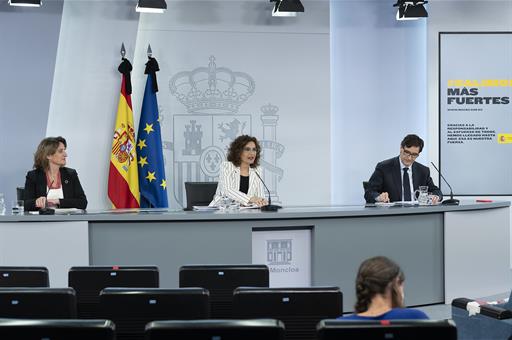Coronavirus COVID-19. Council of Ministers
Government asks Lower House for sixth extension of state of emergency to 21 June
Council of Ministers - 2020.6.2
Moncloa Palace, Madrid
The Council of Ministers agreed to ask the Lower House of Parliament for a further extension to the state of emergency invoked due to the coronavirus pandemic, specifically until midnight on 21 June.
The Minister for the Treasury and Government Spokesperson, María Jesús Montero, claimed that this will be the last extension and that this fortnight will allow the de-escalation process to be completed gradually, in a controlled and safe environment, and with all due guarantees that preparations are in place to continue containing the virus.
María Jesús Montero urged the parliamentary groups to vote in favour of extending the state of emergency in the Lower House on Wednesday with responsibility, and taking into account "the only premise that should prevail, which is protecting the health and the lives of the Spanish people".
Phase 3 to be managed by regional governments and autonomous cities
María Jesús Montero explained that this request for an extension is different from the previous ones in that it establishes that the regional health authorities will have full jurisdiction over managing the de-escalation when they move to Phase 3, which strengthens the government's commitment to "a decentralised country model both territorially and jurisdictionally".
The Minister for Health, Salvador Illa, specified that each president of a regional government or autonomous city will take the corresponding decisions on activities, restrictions, making measures more flexible and even the length of time in Phase 3, as well as managing their jurisdiction over healthcare, "which, it is worth recalling, they have never lost", he underlined.
Learn to live with virus in new normality
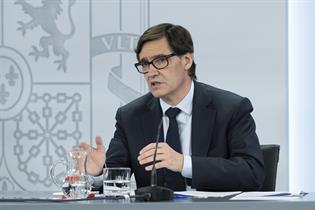 Pool Moncloa/Borja Puig de la BellacasaSalvador Illa stressed that the figures for the last seven days - 39 deaths and 282 new cases - show that the pandemic is under control, thanks, to a great extent, to "the toughest lockdown in the European Union", which has also led to a "a quicker and safer de-escalation".
Pool Moncloa/Borja Puig de la BellacasaSalvador Illa stressed that the figures for the last seven days - 39 deaths and 282 new cases - show that the pandemic is under control, thanks, to a great extent, to "the toughest lockdown in the European Union", which has also led to a "a quicker and safer de-escalation".
Despite this, Salvador Illa reiterated the need to be prudent given the risk of relapses and asked people to "strictly" observe the recommendations by the health authorities in the different phases, since "they are not whimsical, but a thought-out and progressive process".
When we reach the new normality, as from 21 June, the minister stressed that it will still be necessary to constantly wash our hands, maintain a distance of 2 metres from other people (which, according to a WHO study prevents 80% of all infections), use face masks as specified and maintain hygiene in public and private spaces. "The new normality means nothing other than learning to live with the virus until we have an effective treatment or vaccine available".
Official period of mourning until 6 June
The Government Spokesperson recalled that Spain will remain in an official period of mourning until Saturday, 6 June, for those who have died from the coronavirus. I have expressed the deepest sympathies and solidarity of the government to the families of the victims, and "support and encouragement" to those who remain in hospital or convalescing. She also once again expressed her gratitude to all public workers for their efforts and to the Spanish people for tackling this situation with common sense, responsibility and prudence.
Circular Economy Framework
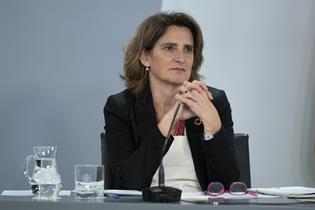 Pool Moncloa/Borja Puig de la BellacasaThe Fourth Vice-President of the Government and Minister for Ecological Transition and Demographic Challenge, Teresa Ribera, reported that the government has approved the Spanish Circular Economy Strategy and a Royal Decree to control the transfer of waste. She also presented the Draft Bill on Waste and Contaminated Land.
Pool Moncloa/Borja Puig de la BellacasaThe Fourth Vice-President of the Government and Minister for Ecological Transition and Demographic Challenge, Teresa Ribera, reported that the government has approved the Spanish Circular Economy Strategy and a Royal Decree to control the transfer of waste. She also presented the Draft Bill on Waste and Contaminated Land.
Teresa Ribera explained that these are key elements of the Circular Economy Framework, which the government wishes to boost to recover a good rate of job creation and economic activity once the coronavirus health crisis is over.
Teresa Ribera advocated a circular economy system in which production and consumption are in line with resources - that are limited - which fights mass waste, fosters a more efficient use of products and reduces the ecological footprint.
This new framework, she argued, will favour new business models and the local economy through local consumption, will reduce dependence on foreign resources and will incorporate new technologies, materials and processes. "The productive and distribution sectors in our country are ready and demand a regulatory framework that facilitates a large-scale transformation and modernisation process", she said.
Circular Economy Strategy
The Spanish Circular Economy Strategy, known as "Circular Spain 2030", seeks to minimise the generation of waste and better harness existing waste management.
Teresa Ribera specified that "Circular Spain 2030" seeks to reduce the national consumption of materials by that year by 30% compared with the GDP, taking 2010 as the year of reference; reduce the generation of waste by 15% on that generated in 2010, thus placing greenhouse gas emissions from the waste sector below 10 million tonnes a year.
It also seeks to reduce the generation of food waste throughout the food chain, achieving up to a 50% per capita reduction for households and retail consumption, and 20% in production and supply chains as from the year 2020, reuse up to 10% of municipal waste generated and improve efficiency in water use by 10%.
The Fourth Vice-President of the Government claimed that six priority productive sectors have been identified to begin to implement this strategy - construction, agri-food, fisheries and forestry, industrial, consumer goods, tourism and the textile and clothing sector.
Future Waste Act
The Council of Ministers analysed the Draft Bill on Waste and Contaminated Land, which provides measures designed to reduce the generation of waste and the use of plastics.
Teresa Ribera specified that the new legislation establishes a reduction in waste of 15% by 2030 compared with the figures for 2010, and reuse and recycling targets for the years 2025, 2030 and 2035. It will also introduce, as from 2025, the separate collection of textiles, used cooking oils and dangerous household waste. It also brings forward the separate collection of bio-waste to 2022 for those municipalities with more than 5,000 inhabitants and to 2024 for others.
Limits on single-use plastics
The future legislation introduces, for the first time, limitations on single-use plastics.
To achieve this, the Fourth Vice-President of the Government announced that, as from July 2021, certain plastic articles will be banned that can be manufactured with other materials, such as cotton-wool buds, cutlery, plates, straws and cosmetic and cleaning products that add micro-plastics in their final production process.
As regards plastic bottles, 77% must be collected separately by the year 2027 and 90% by 2029.
Teresa Ribera announced that the new legislation also imposes "an indirect tax that will be imposed on the manufacture, import and intra-Community purchase of non-reusable plastic containers that will be reused in the Spanish market".
Food waste and non-bottled water
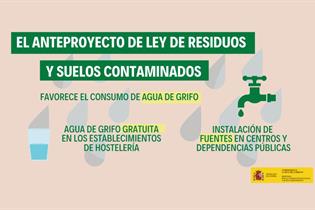 To tackle food waste, the new legislation includes initiatives so that products can be donated when close to their expiry date or reused for animal consumption.
To tackle food waste, the new legislation includes initiatives so that products can be donated when close to their expiry date or reused for animal consumption.
In order to reduce containers, the Fourth Vice-President of the Government stated that the consumption of tap water will be encouraged. Public authorities will have to adopt measures to reduce the consumption of bottled water in their installations and establishments in the hotel and catering and restaurant sector will have to offer customers the possibility of consuming non-bottled water free of charge which is complementary to the offer of the establishment.
As regards prevention, Teresa Ribera indicated that the destruction of surpluses of non-perishable goods that have not been sold, such as clothing, toys and electrical apparatus, will be banned as from 2021.
The text, remarked the Fourth Vice-President of the Government, also includes initiatives to do away with so-called planned obsolescence. Products must be durable, repairable, reusable and updateable.
Control of transfer of waste
The government approved a Royal Decree regulating, clarifying and increasing control in the transfer of waste within national territory.
Teresa Ribera highlighted that the measure will foster recycling and innovation in treatment to reuse waste. The aim is to promote a "production and consumption model in which the value of products is not reduced to a single use but maintain their capacity to offer economic performance", she said.
Transport of goods in Canary Islands and regulation of diving
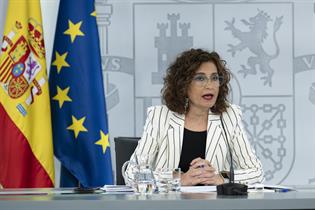 Pool Moncloa/Borja Puig de la BellacasaThe Council of Ministers approved two Royal Decrees on the transport of goods with origin or destination in the Canary Islands and on the regulation for diving
Pool Moncloa/Borja Puig de la BellacasaThe Council of Ministers approved two Royal Decrees on the transport of goods with origin or destination in the Canary Islands and on the regulation for diving
The first, explained María Jesús Montero, improves the framework applicable to subsidies for the air and sea transport of agricultural goods with origin or destination in the Canary Islands to offset their competitive disadvantage as islands. Specifically, the costs that may be subsidised are increased, administrative burdens are reduced and the processing of aid is speeded up
As regards the new regulation of diving activity, María Jesús Montero explained that this updates the existing regulation and emphasises safety, both for those diving and for the marine environment where this takes place. Accordingly, it establishes age limits and the minimum equipment that must be used in each form of diving - for sport, tourism or recreation - and the obligations on sector companies. It also sets a series of limitations that respond to grounds of national security, environmental protection and historical or archaeological interest.
Renewal of National Markets and Competition Commission (Spanish acronym: CNMC)
The government agreed to nominate Cani Fernández to chair the National Markets and Competition Commission, and Ángel Torres as Vice-Chair and Pilar Sánchez, Carlos Aguilar and Josep María Sala as board members.
María Jesús Montero explained that this renewal of senior management comes after the end of the six-year mandate of the previous team and praised the professionalism of all the new candidates, with extensive track-records in the areas of action of the CNMC.
Candidature of Leon
The government approved the candidature of Leon as the headquarters of the European Cybersecurity Industrial, Technology and Research Competence Centre.
This city already hosts the National Cybersecurity Institute of Spain (Spanish acronym: INCIBE), a benchmark centre in the field that the minister, María Jesús Montero, considered a point in favour in the consideration of the EU institutions.
Non official translation





